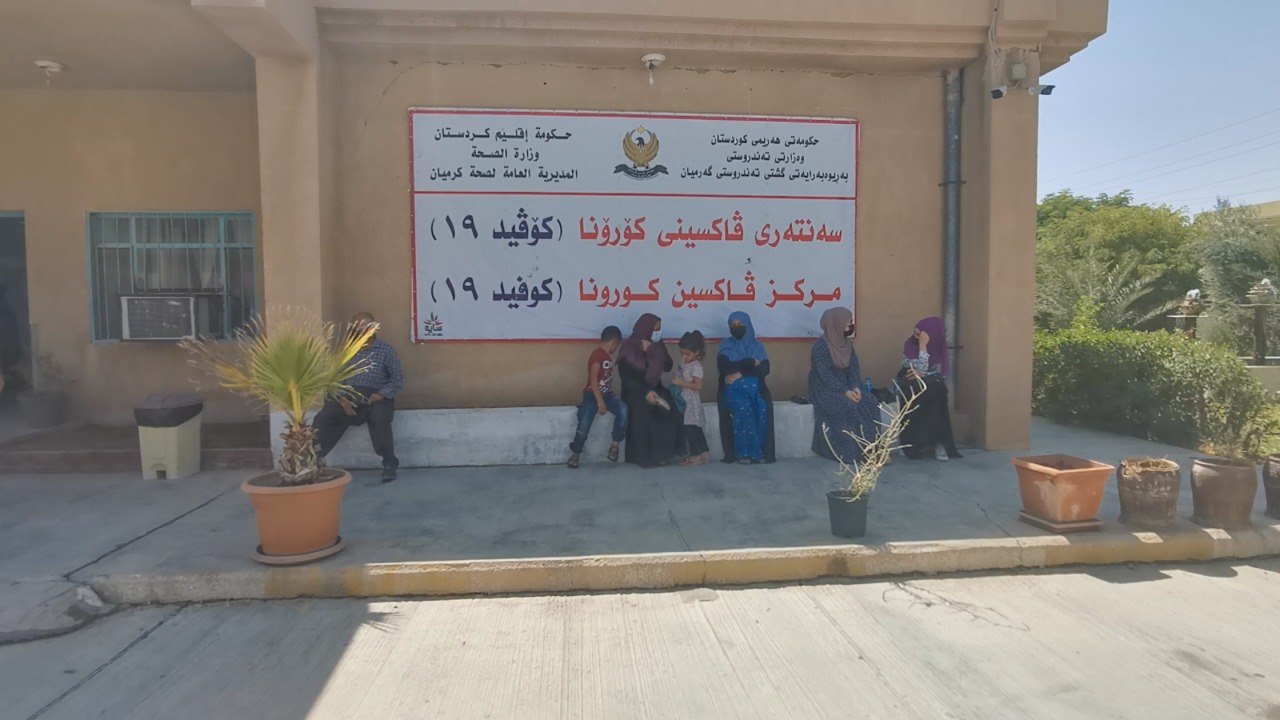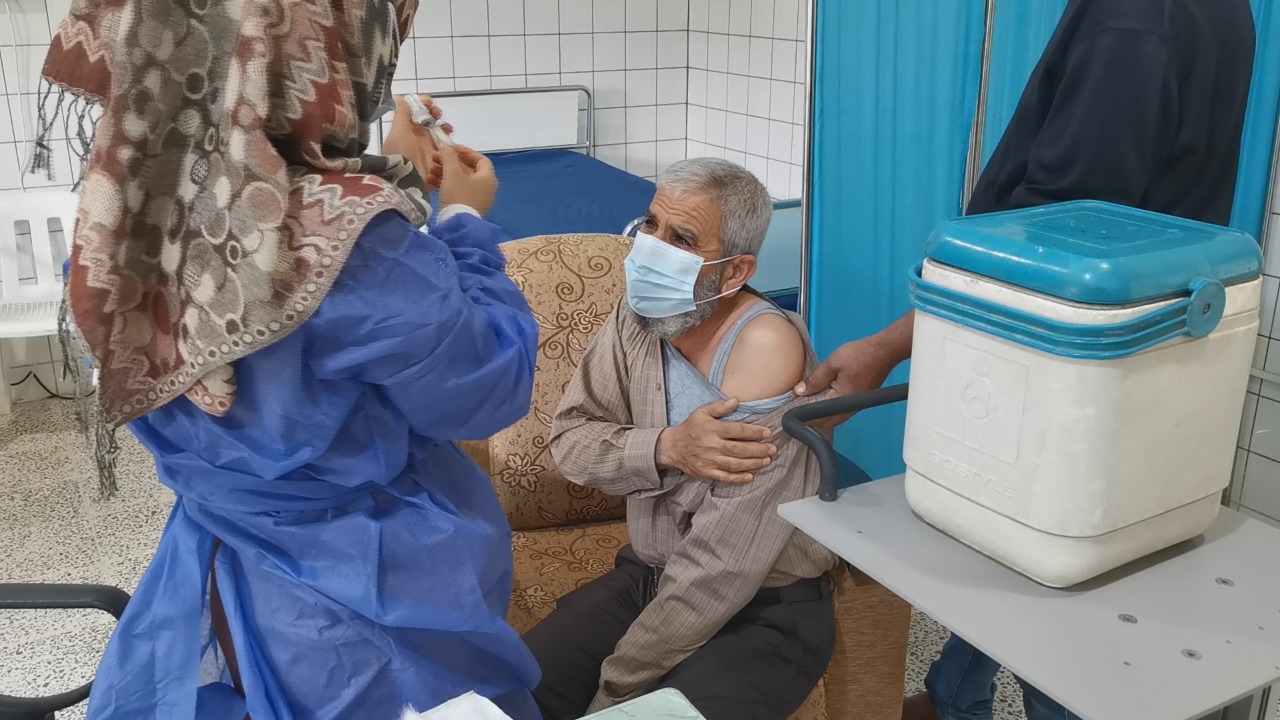Hazhar Qader, a 51-years-old resident of the Kifri district of the Garmian administration, and an employee in one of the government departments paid 60,000 Iraqi dinars IQD (USD40) in exchange for a Coronavirus vaccination card, which is granted after receiving two doses of the Covid-19 vaccine.
Qadir now has the vaccination card without even taking a single dose.
This employee, who refused to reveal his real name for fear of retribution, said, "I do not believe in the necessity of receiving the vaccine and I see that it is harmful to my health so I am not ready to receive the vaccine, and instead I paid the money to get the card because the government decided to hold accountable the employees who do not have the vaccination card."
Now he is able to conduct his affairs at state departments smooothly with the card he obtained.
Qader is not the only one as hundreds of ordinary citizens and government employees within the Garmian local administration of Sulaymaniyah Northern Province obtained the card from the governorates of Salah al-Din and Diyala through mediators.
Trading in COVID-19 vaccination cards is common in Garmian, but government agencies deny any complaints or cases registered by relevant or security services.
Sazan Muhammad, 24, a contract employee at an academic center in Garmian, bought a vaccination card for 100,000 IQD in Kirkuk.
“I am afraid of receiving the vaccine and buying the vaccination card did not cause me any problem. My card is official and registered with the (Iraqi) Ministry of Health,” Sazan said.
People who are scared or reluctant to get Covid-19 vaccines are able to obtain the official vaccination card without taking the vaccine doses. They can use the card to conduct their transactions in government departments or travel abroad since these cards are provided by a network that works directly within health institutions.
The demand on getting the vaccination card without taking any dose of the vaccine in return of paying an amount of money has become a widespread phenomenon in many Iraqi provinces, especially by citizens who are afraid to take the vaccine, of different religions and ethnicities, while the government insists on vaccination in particular to state employees and visitors of state departments.

Abbas Abdelaziz, Deputy Director General of Garmian Health, said they heard some residents of Tuz Khurmatu district of Salahaddin province are getting vaccination cards from the Tikrit and Kirkuk in exchange for money, but they do not have anything official or registered case in their hands.
The vaccination card registration system of the ministry of health under Kurdistan Regional Government KRG is not linked to in the Iraqi ministry of health.
The Deputy Director General of Garmian Health admitted that there are many in Garmian who tried to obtain the card without taking the vaccine doses, but they were not allowed to do so.
Ismael Hassan (his father's pseudonym), from Tuz Khurmatu District, Salah al-Din Governorate, revealed that he has so far sold many vaccination cards to citizens.
“We send a person from our relatives or acquaintances, we take him to a health center, and we have previously agreed with the person responsible for giving the vaccine injection to put a quantity of water in the syringe instead of the actual dose or sprinkles the syringe on the ground,” Hassan elaborated.
He explained that the health employee responsible for giving the injection, "is paid a sum of money and he gives us guarantees that he will record the name of the person to whom the vaccination card is issued in the Iraqi Ministry of Health's data system."
Salah al-Din Governorate Health Department denied the existence of this type of trafficking.
Dr. Ahmed Ali, the Deputy Director General of Salah al-Din Health pointed out that each vaccination center employs more than one employee, and the process goes through several filters to ensure that the person receives the vaccine before the vaccination card is issued to him.
The Deputy Director General of Salah al-Din Health, who is also the director of Tuz Khurmatu General Hospital, said, "We also heard about this case. We followed up on the matter and were unable to obtain proofs."
He pointed out that there is an audit department in their department and that those involved in such matters are held accountable. "We have installed surveillance cameras in all health centers to prevent these violations from occurring."
However, Hassan, who himself obtained vaccination cards several times in Tuz Khurmatu, says, "The purpose of us taking someone to the health center with the intention of receiving the vaccine is to anticipate the issue of surveillance cameras."
There is no official statistic on the number of people who have received COVID-19 vaccination cards in Garmian, but unofficial statistics put the number at more than a thousand.
Most of those who get the vaccination card in this way are state employees, or people who need the card for the purpose of traveling outside Iraq and do not want to issue it officially in Garmyan.
The demand for this type of trafficking increased after the government issued a decision requiring all employees to have a vaccination card. The Supreme Committee to confront Corona, according to Resolution No. (31) issued in October 2021, and the KRG, pursuant to Resolution No. (118) issued on October 27th 2021, obligated all employees to obtain the vaccination card, otherwise they are subject to punishment or deprived of salaries.

Some of the employees in Garmian resorted to illegal methods and paid sums of money to obtain the vaccination card, because they feared or did not trust the vaccine.
The spokesman for the Garmian Police Department, Ali Jamal Qaddouri, said that the police were aware of the matter, but the police did not receive cases of this kind and that this case is the responsibility of the Asayish (security).
"Any case that takes place in areas outside the Kurdistan Regional Administration is investigated by the Asayish."
For its part, the Asayish did not open cases or follow-ups related to this issue.
Othman Abdulkarim, spokesman for the Directorate of Asayish Garmian says, "We also heard about this, but no one was arrested on the charge of involvement in this issue, and no follow-up was conducted because the Health Directorate did not ask the Asayish to follow up on the matter."
According to the statistics of the Qala (The Castle) Hospital for Infectious Diseases in Kalar, in the entire Garmian region, 472 people died as a result of infection with corona from June 2020 to April 2022.
The outbreak of the Corona epidemic in the region has put thousands of lives at risk, and not receiving the vaccine and obtaining the vaccination card by illegal exacerbates these risks.
Dr. Ahmed Saadi, a specialist in internal medicine and an expert in the Covid-19 virus, stresses that this issue threatens community health.
“Taking only one dose of the vaccine leads to building immunity against the virus,” and he warned that “people who evade taking the vaccine are more likely to contract corona.”
In Garmian, fewer people obtained vaccination cards illegally compared to who received it after receiving the doses of the vaccine.
Statistics from the General Directorate of Health in Garmian indicate that 77,200 people received the vaccine from March 2021 to October 2022, and this number represents 19.3% of the total population of the region.
According to the statistics of the Ministry of Health, throughout Iraq, 19.6% of the total population had received two doses of the COVID-19 vaccine until the end of last September.
Examining the numbers of those who obtained the vaccination card illegally and without taking the vaccine doses puts doubt about the validity of the percentage announced by the Iraqi government, because many were registered in the Ministry of Health data system without receiving any dose.
Note: This follow-up was conducted by journalist Saman Karim in the framework of the Rooted in Trust project implemented by Internews in partnership with KirkukNow.





